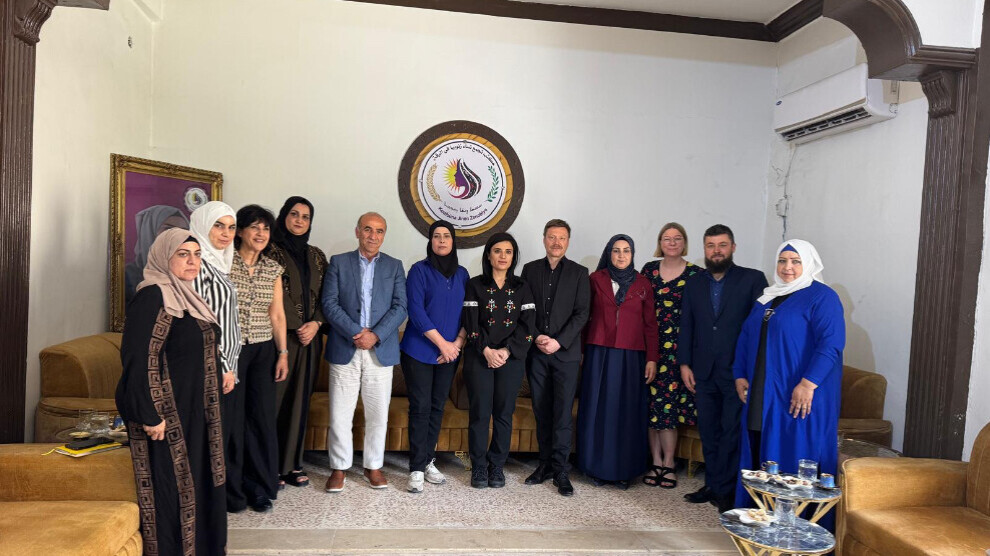EP Left Group Co-Chair holds talks in Raqqa and Kobanê
European Parliament Left Group Co-Chair Martin Schirdewan continues his talks in North and East Syria, meeting with political and civil society actors.
European Parliament Left Group Co-Chair Martin Schirdewan continues his talks in North and East Syria, meeting with political and civil society actors.

The chair of the Left Party in the European Parliament, Martin Schirdewan, continues his trip through Kurdistan. After talks in southern Kurdistan (northern Iraq), including in the Yazidi town of Shengal (Sinjar), he moved to North-East Syria, where he met with representatives of DAANES and civil society organizations in Raqqa and Kobanê.
Schirdewan was accompanied by Philip Degenhardt, Deputy Director General and Head of the International Department at the Rosa Luxemburg Foundation, Fayik Yağızay, representative of the DEM Party to Europe, Nora Friese-Wendenburg, Schirdewan's assistant, and Sarah Glynn, Yağızay's assistant.
The delegation had its first meeting with Hussein Osman, Co-Chair of the Democratic Autonomous Administration of North and East Syria, and his deputies Hamdan Abid and Gabriel Shamoun.
The meeting addressed topics such as negotiations with interim president Ahmed al-Sharaa in Damascus, the appointment of war criminals to key positions, the need for a new interim constitution, Turkey's attacks and ambitions in the region, Europe's relations with Turkey, the principle of decentralization, the effects of the peace process in Turkey, and the protection of the rights of the multinational structure in Syria.
Referring to the amendment recently adopted by the European Parliament calling for stronger support for the Democratic Autonomous Administration of North and East Syria, Schirdewan emphasized the importance of conducting on-site observations and evaluating the contributions of the Left Group.
The delegation then met with representatives of the Zenubiya Women's Association. Women from Raqqa and Deir ez-Zor described their struggle to empower women in a patriarchal society following three years of ISIS rule.
The Zenubiya representatives emphasized the importance of women from different ethnic groups working together. The meeting also discussed the decisive role of Abdullah Öcalan’s philosophy in these efforts, the importance of women's houses, and local mediation mechanisms.
The delegation had another meeting with representatives of displaced persons from Afrin. The families temporarily sheltering in Raqqa were forced to flee first from Afrin to Shehba, and then in December to Raqqa and other areas.
The delegation was informed about the chaos that ensued during the attacks by mercenaries supported by the Turkish state, the fact that people were forced to leave behind even their vital documents, incidents of theft and violence, deaths, and the attacks on those trying to return to Afrin. The situation of citizens who were forced to pay those who occupied their homes has once again brought the need for international guarantees to the forefront. The lack of international support, especially after the US suspended its aid, and the urgency of humanitarian aid were emphasized.
Speaking after visiting families, Schirdewan said that the conditions they witnessed were emotionally very intense. He said that the European Union's decision to add the leaders of the mercenaries controlling Afrin to its sanctions list, while not directly effective, contributed to these individuals losing their international legitimacy.
The delegation then moved to Kobanê, the stronghold of revolution and resistance. After visiting the cemetery of martyrs and areas bearing the scars of war, the delegation met with Ferhan Haci Isa, Co-Chair of the Kobanê Canton, and his deputies. During the meeting, the current situation was assessed in light of the Kurdish people's century-long resistance and the international revolutionary perspective. Despite Turkey's repeated attacks and the self-serving approach of international powers, the discussion concluded with the hope that the call for “Peace and a Democratic Society” made by Abdullah Öcalan will be successful.
The delegation is expected to hold a series of meetings in Hesekê and Qamişlo during the day.